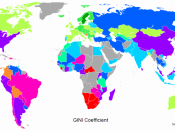It is sometimes argued that economic globalization has made it difficult or impossible for governments to do anything about poverty and inequality, because of unrestricted taxes and regulations would discourage work, drive up the cost of goods produced, invite low-wage imports, and provoke capital to flee abroad seeking higher profits. This is said to produce a ÃÂrace to the bottomÃÂ of governments abandoning democratic programs. Our look at the comparative evidence indicates that this race has not, to any great extent, materialized. Welfare states in the social democracies of Northern Europe and other advanced countries have undergone some marginal cutbacks but remain largely intact. And there remains room to expand the U.S. welfare state without serious competitive disadvantage.
In the United States, government programs especially those intended to combat poverty and inequality are often criticized as ineffective, inefficient, wasteful, and destructive of freedom. Recently a powerful new analysis has been added, asserting that a new factor of economic globalization has made it all the more difficult, perhaps impossible, for governments to do anything at all about poverty or inequality.
If they try to do so, the argument goes that the necessary taxes and regulations will simply discourage work, drive up the costs of goods we produce, invite low-wage imports, and provoke capital to flee abroad where it can get bigger profits free of government interference. According to this logic, any government that tries to resist the ÃÂrace to the bottomÃÂ will impose unbearable costs upon its own economy. When it comes to poverty and inequality, the story goes, governments are basically powerless.
No matter how much human capital people may accumulate, they cannot hope to earn satisfactory incomes unless they have access to jobs at good wages. History makes clear that private markets, left to themselves, generally will not provide...


